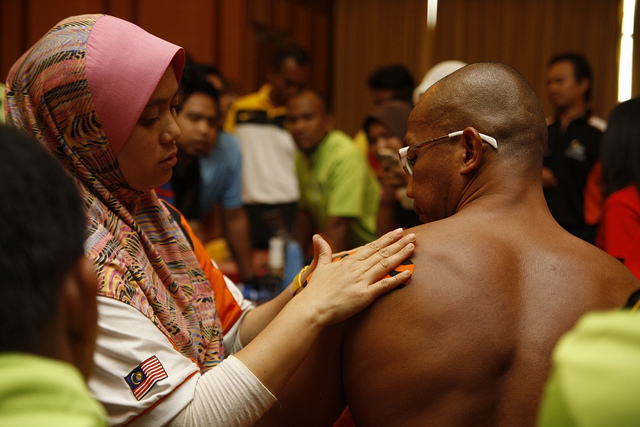Why All Golfers Should Visit A Sports Injury Physio?

A standard golf swing is comprised of a series of complex movements, which is why the vast majority of golfers are limited by their own physical abilities to run through these movements. Some golfers may suffer from poor coordination between their body segments others may lack the strength, control and flexibility to pull off a good swing. Sports injury physios can help a great deal by working with players to strengthen their weaknesses.
Science tells us that the way we move and posture our selves daily can have a great affect on our body’s ability to swing a golf club optimally. There are key muscle imbalances that will develop overtime if we continue using our bodies poorly. Bad movement habits will develop in order to compensate for old injuries. All of which can manifest itself in your golf swing.

Players who have a strong left side may tend to continue using their left end more than their right, which means that their right side becomes the weaker side. If you’ve noticed that your left side is very strong then it could get just as easily damaged because it is doing all the work. In order for your body to perform optimally it has to be symmetrical. You’ll need to work a lot like how baggage handlers work by shifting the load from one side to another in order to make sure that one side does not get overly strained.
A sports injury physio will often prescribe a series of corrective exercises as opposed to just generic workouts. If you’ve noticed that one side is overpowering the other you should get yourself screened by a physiotherapist in order to better understand what is going wrong. So, in addition to a custom fit club you also need to custom fit your body.
The aim of sports physiotherapy treatment for golf players:
In order to achieve all of the three sports physios need to start working on the ‘trunk’ which is a key part of a regular golf swing. The thoracic spine needs to be worked on in particular since it is responsible for the majority of movement during a swing. A restriction here for whatever reason can lead to lots of strain on the lower back and the neck, this will inevitably shorten the length of the swing and also reduce efficiency. The other joints may probably work to compensate for this lack of movement or stiffness by being more mobile.
Many golfers complain of an injured back, the reason being that a standard golf swing will end when the lower back is extended. This obviously requires good strength and control of the stomach muscles in order to prevent the lower back from over stretching to the point of facet joint and disc injuries. Therapists will work with golfers in order to get the hips to rotate properly, with particular focus on the leading hip which is very important for a follow through during a swing.
A restricted hip will often lead to extra strain on the lower back and the knee making them both vulnerable to an extended injury.
Sports therapists will also work with golfers on their neck rotation and its stability. This is important for good eye to ball contact when swinging. Restrictions within each joint will end up disturbing the neck movement. There are some golfers that find it very difficult to avoid hunching as part of their stance. This of course prevents full rotation of the spine during both the forward and back swing.
However, the right cues will help a golfer learn how to hold his spine in a neutral backward or forward position, which will also increase range of motion as well as power. This also means a lower risk of injury.
A professional sports injury physiotherapist will use the following to treat golfers:
Regardless of if you are a weekend golfer or a professional you need to go through the right preparation ritual (stretching and light warm up exercises) in order to avoid injury.
License: Creative Commons
image source
Manu Alias is a sports physiotherapist with over a decade of experience working with amateur and pro golfers.
